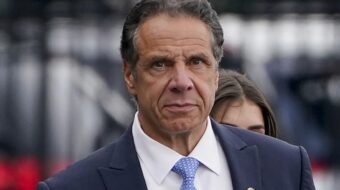OAKLAND, Calif. — Just when soaring gas prices, clogged highways and deepening worries about global warming are leading Americans to abandon their cars for public transit, a budget squeeze is wrapping itself like a boa constrictor around the nation’s public transit systems.
But those very factors could inspire a new national vision of transit’s vital role.
The New York Times recently reported that transit ridership has grown by at least 5 percent this year in New York and Boston, while other metropolitan areas in the South and West have seen ridership soar by as much as 10-15 percent.
However, hikes in fuel prices and other costs are hitting public transportation hard. And when budgets are tight, federal and state funds for public transit can be prime targets.
These factors converged last month here, as over 50 area residents addressed a hearing on fare increase proposals for AC Transit, whose buses carry a quarter million people daily on the eastern side of San Francisco Bay. In one proposal, adult local fares would rise from $1.75 to $2.00, youth passes would soar from $15 to $28 per month and passes for seniors and disabled riders would rise from $20 to $28.
“Take this off the backs of youth and seniors,” Andrew Montgomery, president of United Seniors of Oakland and Alameda County, told AC Transit’s elected board of directors. Montgomery warned against increasing the hardships for seniors facing rising costs for food and housing, as well as for youth already struggling to stay in school.
Several young people warned that nearly doubling the cost of youth bus passes could cause students to drop out.
Oakland-based Urban Habitat says over three-quarters of AC Transit riders are people of color, and more than half the adult riders report household incomes under $30,000 per year.
The union representing AC Transit’s bus drivers is also concerned. Rebecca Jones-White, a long-time driver and now financial secretary of Amalgamated Transit Union Local 192, told a pre-hearing rally, “We should not stand for this; this is a fight for all of us.” Noting that passengers already have to wait too long, and drivers’ schedules don’t allow enough time to eat or use the restroom, she said, “You need good dependable service, and it does not have to be at the cost of our senior citizens or our youth.”
After the rally, Jones-White said the biggest step to solve the budget problem is for people to “demand the tax dollars voters and the Legislature already allocated for mass transit.” She added, “End the Iraq war and get that money back!”
AC Transit’s board is expected to decide the issue later this month. In the past, directors have expressed reluctance about an increase. Fares were last raised in 2005.
The California Public Interest Research Group says less than 20 percent of statewide transportation money now goes to public transit, and transit funding is often targeted for cuts. In revised 2009 budget projections announced May 15, Republican Gov. Arnold Schwarzenegger proposed taking $1.4 billion from public transportation to help redress a $15 billion shortfall in the nearly $102 billion general fund budget.
That translates into a 72 percent cut in state funds for Bay Area transit operations, Carli Paine of the Transportation and Land Use Coalition told the World.
Meanwhile, the Bush administration’s 2009 budget projections target transportation for an overall 10 percent cut from current levels. Gaps in the highway fund are to be plugged with money from mass transit.
Mass transit has been consistently and drastically undervalued at the federal level during the last half century, John Krieger, staff attorney at the U.S. Public Interest Research Group, said in a telephone interview. With hundreds of municipalities seeking a share of limited funds, he said, monies available to any community are diluted. Transportation funding has become a source of “pork” for legislators’ pet projects, he added.
With current surface transportation legislation expiring at the end of 2009, Krieger said, a “perfect storm” — “the extremely high cost of gas, concern about oil dependency and global warming, wide-scale congestion in urban centers and an aging infrastructure that can’t handle current capacity” — points toward a brand new vision.
“If Congress is paying attention to these factors,” he said, “then they will change the way they fund this bill and it will no longer be a project handout bill.”
mbechtel@pww.org









